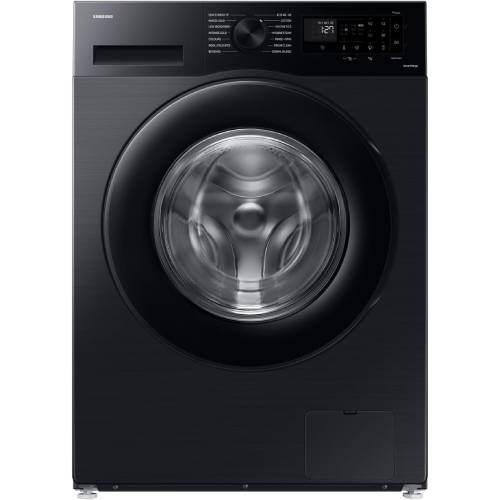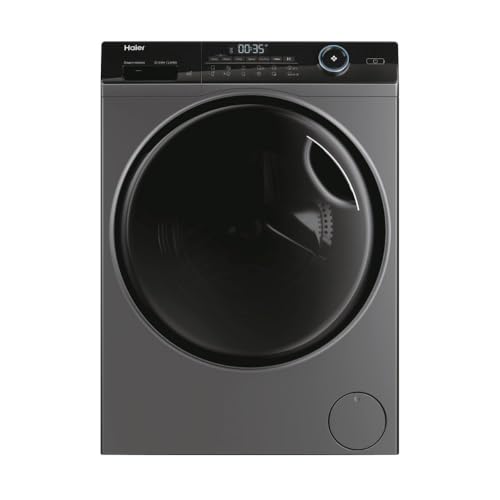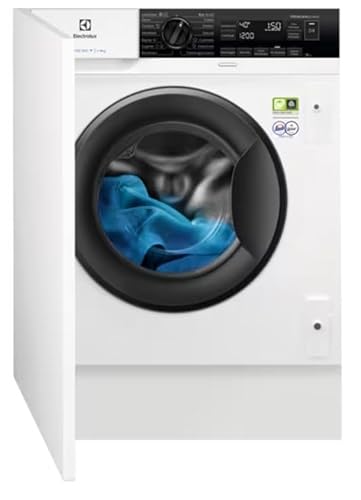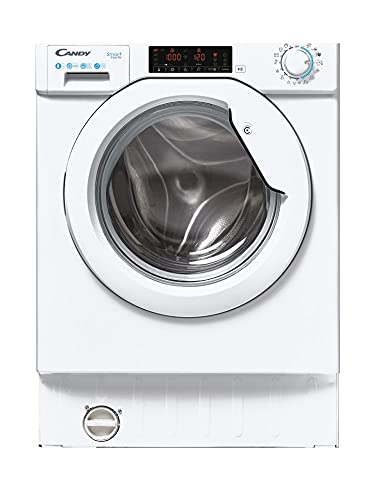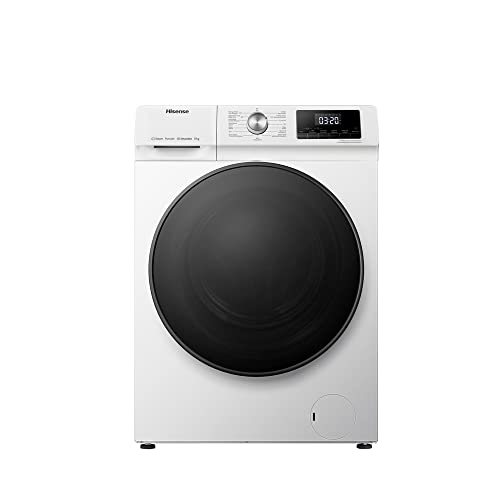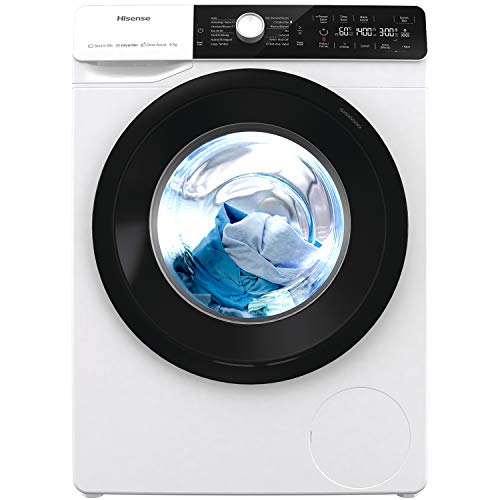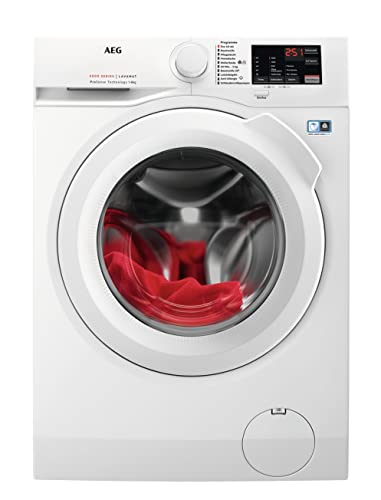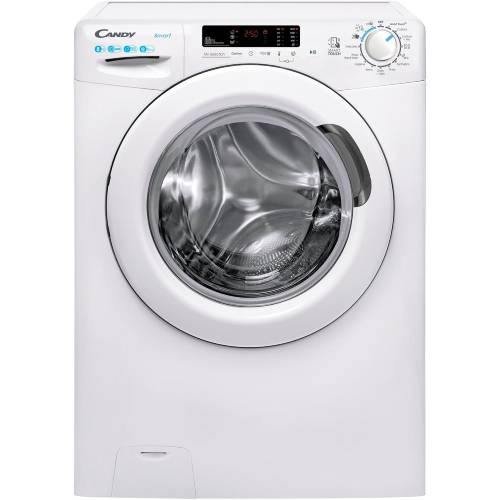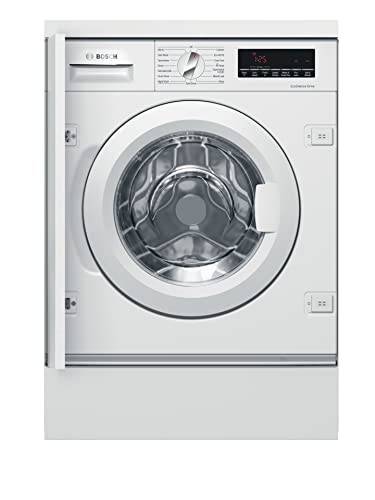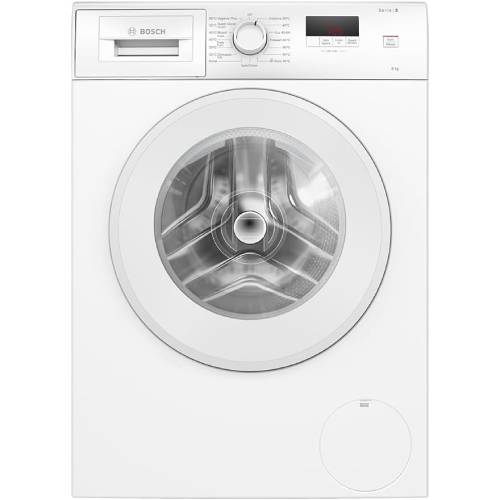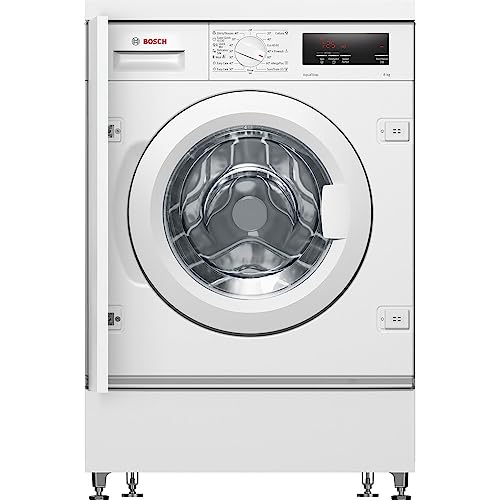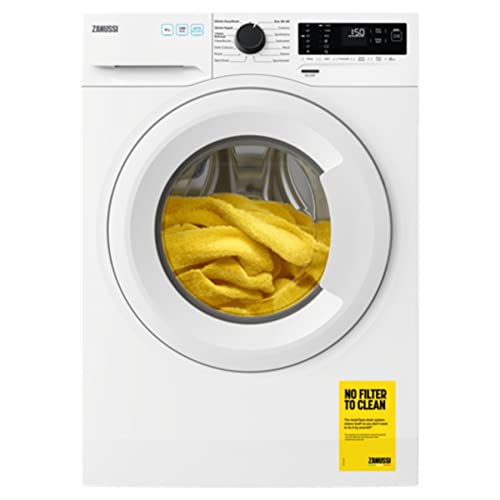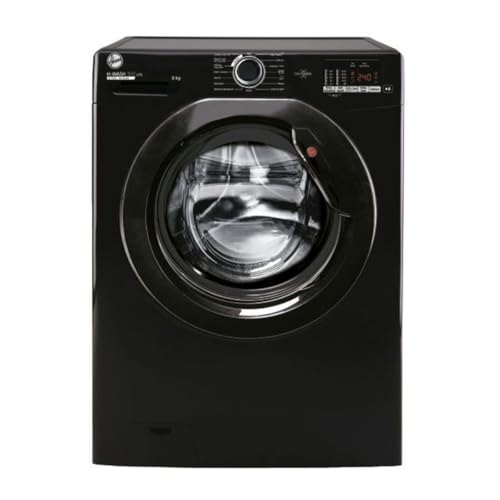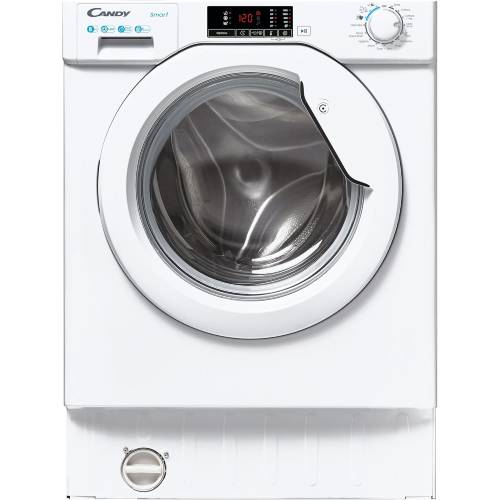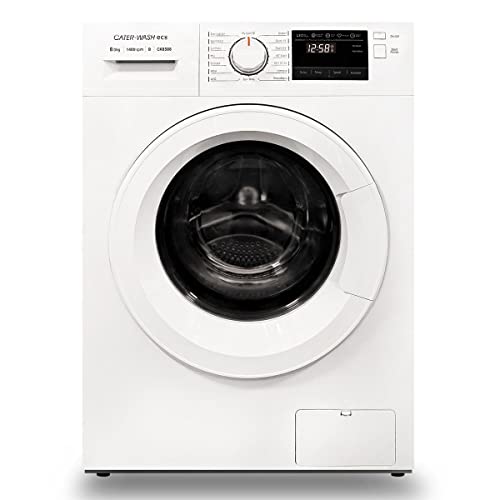Are 8 kg washing machines good?
8 kg washing machines achieve an average overall score of 7.1 points, which aligns with the market average. Their performance surpasses that of 6 kg and 7 kg machines, which have average scores of 6.2 and 6.6 points respectively, but is slightly below 9 kg and 10 kg models, with scores of 7.5 and 7.1 points.
The average user rating for 8 kg washing machines is 7.9, which is lower compared to other capacities. For example, 6 kg machines have a rating of 8.1, 7 kg machines score 8.2, and 9 kg machines reach 8.3.
Approximately 27% of washing machines on the market have an 8 kg capacity.
What are the main advantages of 8 kg washing machines compared to other capacities?
8 kg washing machines offer the following advantages over models with other capacities.
- Wide variety of models: about 27% of all washing machines on the market have an 8 kg capacity.
- Versatile options: 8 kg washing machines include both top-loading and slim models.
- Lower average cost: 8 kg machines cost on average £10 less than the market average (£370 compared to £380), with a strong ratio quality-price of 7.1 points.
- Higher user ratings: 8 kg washing machines have an average user rating of 7.9, which is higher than the market average of 8.1 points.
- Prevalence of inverter motors: 79% of 8 kg washing machines are equipped with an inverter motor.
- Good energy efficiency: 8 kg machines consume an average of 55 kWh per 100 cycles, and 48% belong to energy efficiency class A.
- Effective water extraction: 93% of 8 kg washing machines are in spin-drying efficiency class B, and 72% can reach a maximum spin speed of 1400 RPM.
- Low noise levels: 8 kg washing machines have an average spin noise level of 74 dB and a washing noise level of 53 dB.
- Specialised washing cycles: 8 kg washing machines often include cycles like Anti-stain, Jeans, Shirts, Duvets, Hygiene, Baby Care, and Sport/Outdoor.
- Advanced features: most 8 kg washing machines integrate foam control systems, load balancing systems, laundry detection systems, and steam technology.
- Additional technologies: many 8 kg washing machines come with memory functions, smart diagnosis, AquaStop systems, and pre-mix technology. High-end models include Wi-Fi, NFC, automatic drawer cleaning, energy-saving modes, water jet systems, AI technology, or automatic dosing systems.
What are the main disadvantages of 8 kg washing machines compared to other capacities?
8 kg washing machines have the following disadvantages compared to models with other capacities.
- Limited spin speed: approximately 40% of 8 kg machines do not reach a minimum spin speed of 400 RPM, which can impact washing delicate items.
- Higher energy consumption: top-loading 8 kg machines consume more energy, about 78 kWh per 100 cycles.
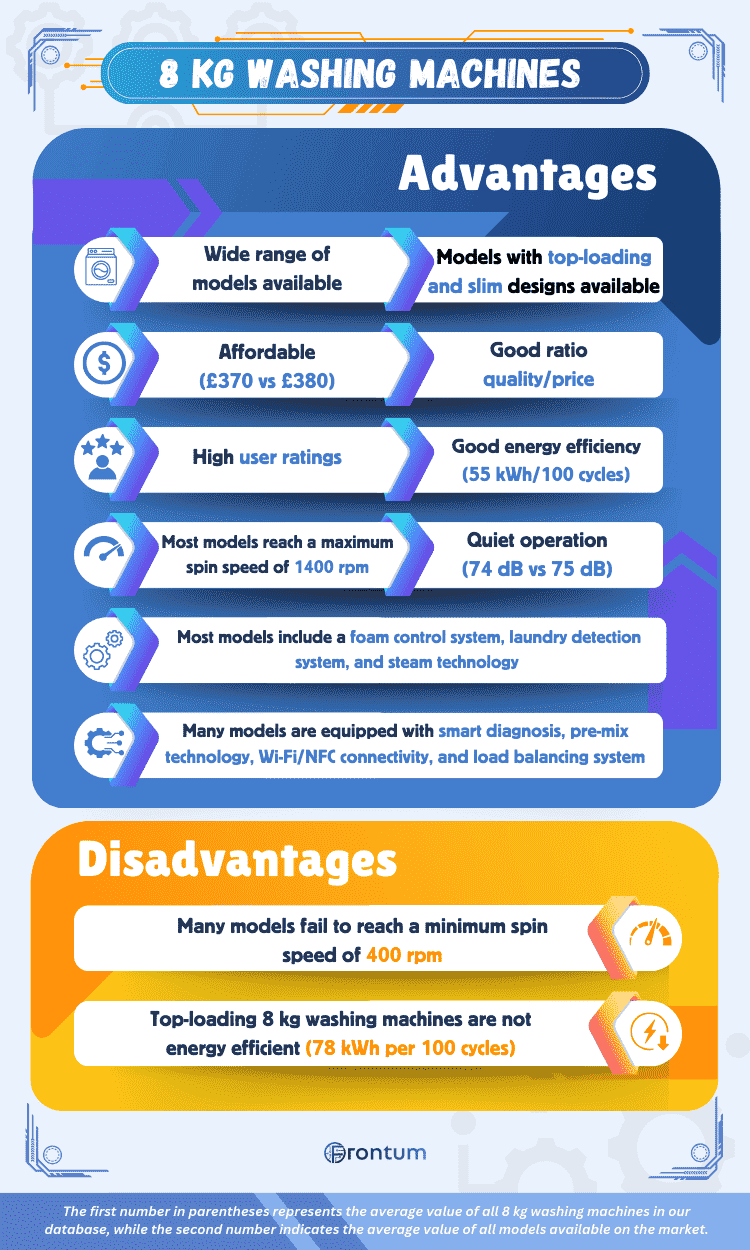
Are 8 kg washing machines large enough?
An 8 kg washing machine is perfect for families of up to four people. This capacity allows handling medium to large loads, such as bedding, towels, and clothing, in a single cycle. If you have specific needs, such as washing duvets or very heavy fabrics, a larger capacity might be more suitable. However, 8 kg washing machines strike a good balance between efficiency and space, making them a popular choice among users. They are ideal for daily use, allowing families to manage laundry without taking up too much space.
How many clothes can you fit in an 8 kg washing machine?
An 8 kg washing machine can handle a significant amount of laundry. However, the actual quantity of clothes depends on the types of garments and fabrics.
An 8 kg washing machine can accommodate the following items.
- 35-40 t-shirts (150-200g each)
- 10-12 pairs of jeans (600-700g each)
- 12-15 towels (500g each)
- 12-15 sheets (500-600g each)
- 14-18 sweaters (400-500g each)
- 140-160 socks (50g per pair)
- A mixed load of 13 t-shirts, 2 pairs of jeans, 3 towels, 2 sheets, 3 sweaters, and 10 pairs of socks fits within the capacity of an 8 kg washing machine.
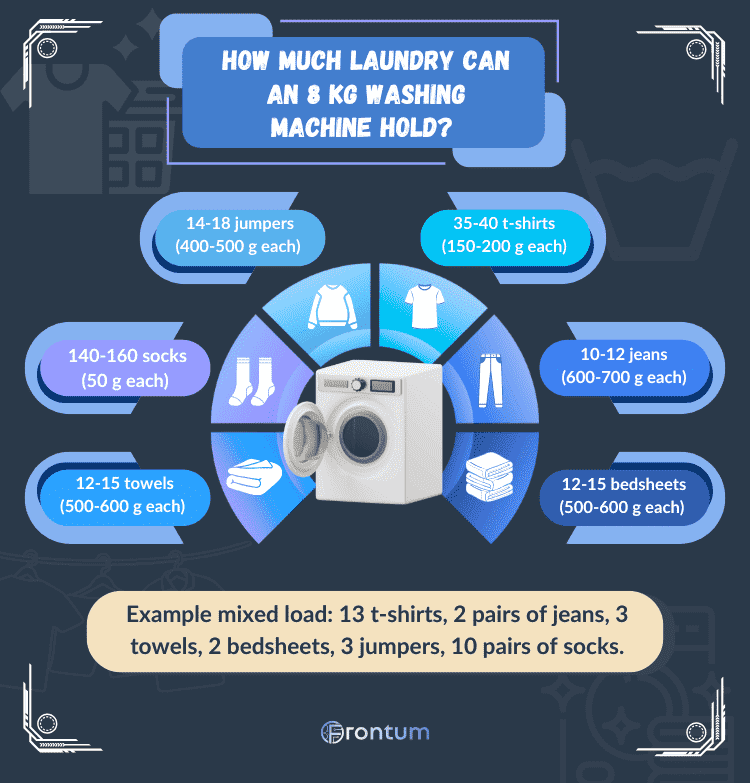
Is it better to choose a 7 kg or an 8 kg washing machine?
An 8 kg washing machine is ideal for families of 3-4 members, capable of handling larger loads and fitting approximately 40-50 t-shirts or two sets of king-size bedding, reducing the number of cycles required. This capacity is particularly useful for larger families or those with higher laundry demands, such as households with children.
For smaller families (1-2 people) or if you have limited space, a 7 kg washing machine might be more appropriate. With the ability to handle around 35 shirts per load, it is perfect for daily needs without overloading. A 7 kg washing machine is especially suitable for lighter loads such as t-shirts, underwear, or towels.
How much do 8 kg washing machines cost?
An 8 kg washing machine costs between £200 and £1,200, with an average price of around £370. By comparison, a 7 kg washing machine has an average cost of approximately £330, while a 9 kg model has an average price of about £480.
The chart below shows the price distribution among 8 kg washing machines.
[vertical-chart-72589820]
The cheapest 8 kg washing machines are as follows.
- Candy Smart CS1482DW4 (~£250)
- Cater-Wash CK8588 (~£250)
- Hoover H-WASH 300 LITE H3W582DBBE (~£290)
8 kg washing machines score 7.1 points for ratio quality-price, a value in line with the market average. This indicates that these washing machines offer a good balance between quality and cost.
The following list includes 8 kg washing machines with the best ratio quality-price.
- Haier HW80-B14959S8U1 I-Pro Series 5 (Ratio quality-price: 7.98 points)
- Candy Smart CS1482DW4 (Ratio quality-price: 7.92 points)
- Hisense WFGA80141VM GA Serie (Ratio quality-price: 7.51 points)
What are the best brands of 8 kg washing machines?
The best brands of 8 kg washing machines are as follows.
- Haier (Average overall score: 7.8 points)
- Samsung (Average overall score: 7.7 points)
- Siemens (Average overall score: 7.6 points)
The worst brands of 8 kg washing machines are as follows.
- SanGiorgio (Average overall score: 5.3 points)
- Indesit (Average overall score: 6.3 points)
- Midea (Average overall score: 6.4 points)
The following chart ranks 8 kg washing machine brands based on overall score.
[horizontal-chart-52798001]
Which brands of 8 kg washing machines have the highest user ratings?
The brands of 8 kg washing machines with the highest user ratings are as follows.
- Siemens (Average user rating: 8.9 points)
- Haier (Average user rating: 8.7 points)
- Bauknecht (Average user rating: 8.6 points)
The chart below shows the rankings of 8 kg washing machine brands based on user ratings.
[horizontal-chart-22861422]
What should you consider when choosing the best 8 kg washing machine?
When selecting the best 8 kg washing machine, focus on aspects like energy consumption (energy class), water usage, spin efficiency, noise levels, motor type, and washing programs.
Ensure that the drum volume and machine dimensions fit your space. Opt for models with an inverter motor, which ensures quieter operation and greater durability. High spin efficiency reduces drying times and saves energy and water. A variety of washing programs allows better treatment for different fabrics and stains, improving cleaning performance.
Are front-loading 8 kg washing machines better than top-loading 8 kg washing machines?
Front-loading 8 kg washing machines outperform top-loading models. Front-loading models achieve an overall score of 7.2, while top-loading models score 5.9 points.
Approximately 90% of 8 kg washing machines on the market are front-loading, while only 10% are top-loading.
The chart below illustrates the distribution of 8 kg washing machines by loading type.
[pie-chart-81082663]
Front-loading 8 kg washing machines offer the following advantages over top-loading models.
- Greater popularity: about 90% of 8 kg washing machines on the market are front-loading.
- Larger drum volume: front-loading 8 kg washing machines have an average drum volume of 55 litres, which is 9 litres more than the 46 litres of top-loading 8 kg models.
- Quieter operation: during spin cycles, front-loading 8 kg machines average 73.5 dB, compared to 79 dB for top-loading models. During washing, front-loading machines average 53 dB, compared to 57.5 dB for top-loading models.
- Higher user ratings: front-loading 8 kg washing machines receive an average user rating of 7.9, slightly higher than the average rating of 7.8 for top-loading models.
- Higher prevalence of inverter motors: 84% of front-loading 8 kg washing machines have an inverter motor, compared to only 36% of top-loading 8 kg models.
- Lower energy consumption: front-loading 8 kg machines consume approximately 31% less energy, at 54 kWh per 100 cycles compared to 78 kWh for top-loading machines. Additionally, 43% of front-loading 8 kg models have an A energy class, while no top-loading 8 kg models achieve this rating.
- Better water extraction: 72% of front-loading 8 kg washing machines can reach a maximum spin speed of at least 1400 RPM, compared to only 45% of top-loading 8 kg models.
- More washing options: cycles such as Shirts, Duvets, and Anti-Allergy, as well as features like extra rinse and quick wash, are more common in front-loading 8 kg washing machines than in top-loading models.
- Advanced features: technologies such as steam, automatic dosing systems, automatic drawer cleaning, and AI are more prevalent in front-loading 8 kg washing machines compared to top-loading models.
The best front-loading 8 kg washing machines are as follows.
- Samsung WW80CGC04DABEU WW5000C (Overall score: 8.18 points)
- Haier HW80-B14959S8U1 I-Pro Series 5 (Overall score: 7.79 points)
- Electrolux EW8F384BI UltraCare 800 (Overall score: 7.76 points)
Top-loading 8 kg washing machines offer the following advantages over front-loading models.
- Lower cost: top-loading washing machines are on average £50 cheaper (£330 compared to £380 for front-loading models).
- More flexible spin speeds: 72% of top-loading 8 kg washing machines reach a minimum spin speed of 400 RPM, compared to 60% of front-loading models.
- Some features are more common: pre-mix technology, self-cleaning function, memory function, and NFC technology are more present in top-loading models.
- Space-saving and lighter: top-loading washing machines occupy about 25% less space (0.21 m³ versus 0.28 m³) and weigh about 12 kg less (56 kg compared to 68 kg).
- Easier loading and unloading: top-loading washing machines are simpler to load and unload.
- Less prone to issues: top-loading washing machines are less likely to develop mould and bad odours compared to front-loading models.
The following list includes the best top-loading 8 kg washing machines.
- Hoover H-WASH 300 H3TFMQ48TAMCE-84 (Overall score: 7.26 points)
- Hoover H-WASH 300 H3TSM48TAMCE-11 (Overall score: 7.05 points)
What is the drum volume of 8 kg washing machines?
The drum volume of 8 kg washing machines ranges from 46 to 68 litres, with an average of 55 litres. By comparison, 7 kg washing machines have an average drum volume of 48 litres, while 9 kg machines reach an average of 61 litres. Front-loading 8 kg washing machines feature a drum capacity that is about 9 litres larger than that of top-loading models (55 litres versus 46 litres).
The chart below shows the distribution of drum volumes among 8 kg washing machines.
[vertical-chart-48409240]
Drum volume is an important factor when washing large loads or bulky items. A larger drum helps to clean clothes more effectively and reduces wrinkles, increasing washing efficiency. Drum size also affects the amount of water and detergent required per load.
The 8 kg washing machines with the largest drum volumes are as follows.
- Bosch WGE03408GB Series 2 (Drum volume: 65 L)
- Candy Smart Inverter CBW 48TWME (Drum volume: 58 L)
- Hoover H-WASH 300 LITE H3W582DBBE (Drum volume: 58 L)
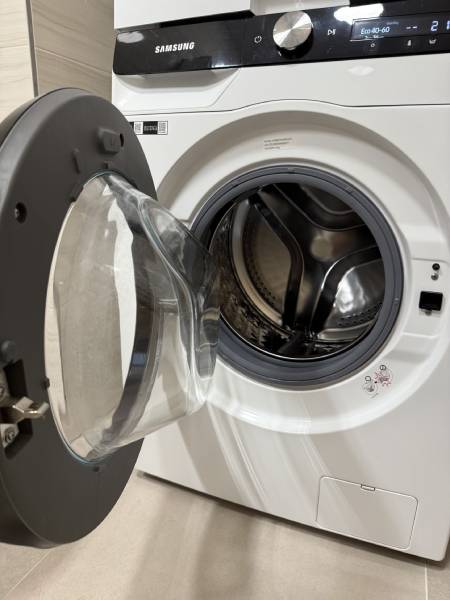
How much space do 8 kg washing machines take up?
8 kg washing machines occupy a space of 0.21 to 0.37 m³, with an average of 0.28 m³. Compared to 7 kg models, they require 12% more space (0.25 m³), while they occupy about 5% less space than 9 kg machines (0.295 m³).
The depth of 8 kg washing machines ranges from 45 to 66 cm, so it is possible to find slim models. Width ranges from 40 to 60 cm, with top-loading machines typically narrower (around 40 cm) and front-loading machines averaging 60 cm. Make sure to choose a machine that fits the space where you plan to install it.
The most compact 8 kg washing machines are as follows.
- Candy Smart Inverter CBW 48TWME (Volume: 260760 cm³)
- Electrolux EW8F384BI UltraCare 800 (Volume: 263586.96 cm³)
- Bosch WIW24342EU Serie 6 (Volume: 265215.232 cm³)
What is the energy efficiency of 8 kg washing machines?
8 kg washing machines range in energy efficiency from class A to F. Most machines, 48%, belong to class A, while 17% are in class B, 19% in class C, 10% in class D, 2% in class E, and 4% in class F. Classes range from A (best) to G and are indicated on the energy label of each washing machine.
The chart below provides an overview of the energy class distribution of 8 kg washing machines.
[pie-chart-40262881]
Energy consumption generally aligns with energy classes: class A washing machines consume less than 49 kWh per 100 cycles, while class B models consume less than 55 kWh. However, this correlation can slightly vary depending on capacity.
8 kg washing machines consume between 42 and 80 kWh per 100 cycles, with an average consumption of 55 kWh, which is in line with the market average. If you want to save on energy costs with an 8 kg machine, consider choosing a front-loading model, which consumes about 31% less energy than a top-loading machine (54 kWh versus 78 kWh).
The most energy-efficient 8 kg washing machines are as follows.
- Bosch WGE03408GB Series 2 (Energy consumption: 46 kWh/100 cycles per 100 cycles)
- AEG L6FBA51480 6000 Series ProSense (Energy consumption: 47 kWh/100 cycles per 100 cycles)
- Candy Smart Inverter CBW 48TWME (Energy consumption: 47 kWh/100 cycles per 100 cycles)
In terms of water consumption, 8 kg washing machines use between 37 and 52 litres per cycle, with an average of 46.5 litres, a value similar to the market average. Machines with higher capacities tend to use more water: 7 kg models average 45 litres per cycle, while 9 kg machines use about 49 litres per cycle.
What is the spin efficiency of 8 kg washing machines?
The spin efficiency of 8 kg washing machines typically falls within classes A to C. Most 8 kg washing machines belong to class B (93%), which is the most common spin efficiency class across all capacities. Class C represents 5% of 8 kg machines, while class A covers 2%.
The chart below illustrates the distribution of spin efficiency classes among 8 kg washing machines.
[pie-chart-87981609]
Spin efficiency indicates how well a washing machine removes moisture during the spin cycle. This parameter is closely linked to the maximum spin speed, which impacts the residual moisture level at the end of the wash. Higher spin speeds reduce remaining moisture: for instance, at 1600 RPM about 43% moisture remains, at 1400 RPM about 50%, and at 1200 RPM about 53%.
For 8 kg washing machines, maximum spin speeds range from 1000 to 1600 RPM, with 1400 RPM being the most common (72%). Approximately 23% of 8 kg machines reach a maximum spin speed of 1200 RPM. These figures surpass the market average, where 60% of washing machines achieve 1400 RPM and 22% reach 1200 RPM.
A higher spin speed can be helpful to reduce drying times, especially for heavier items. If you frequently wash delicate fabrics, consider the minimum spin speed, as more delicate materials require lower speeds to avoid damage. For 8 kg washing machines, minimum spin speeds range from 400 to 800 RPM, with 61% of machines offering a minimum spin speed of 400 RPM.
How noisy are 8 kg washing machines?
8 kg washing machines emit noise levels during the spin cycle ranging from 66 dB to 81 dB, with an average of 74 dB. This value is slightly below the market average, which stands at around 75 dB. Since the spin cycle is the noisiest phase of the washing process, it serves as a good indicator of a washing machine's overall noise level.
The noise emission class, which classifies a washing machine's noise level, ranges from A to D. Class A corresponds to noise levels below 73 dB, class B covers 73 to 76 dB, class C refers to levels between 77 and 80 dB, and class D includes models with noise levels above 80 dB. Among 8 kg washing machines, 41% fall within class A, and 38% belong to class B.
The chart below shows the distribution of spin noise levels among 8 kg washing machines.
[vertical-chart-68226417]
The noise level during washing (being lower than during spinning) has less impact on the user experience. For 8 kg washing machines, washing noise levels range from 41 to 62 dB, with an average of 53 dB.
How many washing programs do 8 kg washing machines offer?
8 kg washing machines offer between 10 and 24 washing programs, with an average of 15, which is in line with the market average. Washing programs for this capacity are similar to those of other machines and generally include 1-3 quick cycles under 1 hour. The ECO cycle has a duration ranging from 180 to 230 minutes, with an average of about 218 minutes.
All 8 kg washing machines include basic programs such as Cotton, Eco 40-60, Synthetics, Quick Wash, Mixed Fabrics, Wool, and Prewash. However, they stand out for their specialised programs: 67% have an Anti-Stain cycle, 45% include a Jeans cycle, 41% offer a Duvet cycle, 62% have a Hygiene cycle, 32% provide a Baby Care cycle, 68% include an Outdoor/Sport cycle, 71% feature an Anti-Allergy cycle, and 41% offer a Shirts cycle.
[vertical-chart-65335509]
The most common washing functions in 8 kg machines include the quick function (52%), extra rinse (79%), anti-crease function (72%), rinse hold (42%), and anti-stain function (59%). Some models also feature wash assist (24%), silent mode (20%), soak function (11%), or Water+ function (6%).
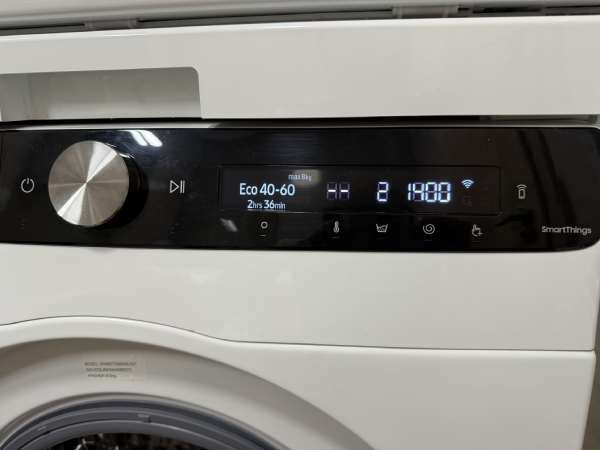
What features do 8 kg washing machines have?
8 kg washing machines offer a range of features similar to those of machines with other capacities. The number of features varies from 3 to 18, with an average of 10 features.
The chart below illustrates the distribution of features in 8 kg washing machines.
[vertical-chart-99720390]
The most common features in 8 kg washing machines include.
- Laundry detection system (94%)
- Foam control system (80%)
- Self-cleaning function (67%)
- Steam technology (58%)
- Inverter motor (79%)
Advanced 8 kg washing machines include the following features.
- Memory function (32%)
- AquaStop system (37%)
- Smart diagnosis function (34%)
- Load balancing system (34%)
- Pre-mix technology (27%)
- Wi-Fi connectivity (14%)
- Automatic drawer cleaning (11%)
- Energy-saving mode (17%)
- Water jets system (17%)
- NFC connectivity (10%)
- AI technology (9%)
- Automatic dosing system (5%)
The 8 kg washing machines with the highest number of features are as follows.
- Samsung WW80CGC04DABEU WW5000C (21 features)
- Electrolux EW8F384BI UltraCare 800 (20 features)
- Candy Smart CS1482DW4 (17 features)
When selecting a washing machine, consider the features most relevant to your needs. If convenience is a priority, look for models with Wi-Fi connectivity, automatic dosing systems, or self-cleaning functions. For better laundry care, choose washing machines with load balancing systems, foam control systems, and steam technology. If energy efficiency and durability are key factors, an inverter motor model will be an ideal choice.

